A Musical Voyage To China(一个中国音乐的旅行)
中国音乐英语作文带翻译

Title:The Charm of Chinese MusicChinese music is a treasure of the Chinese nation,with a long history and profound cultural connotations.It is an important part of Chinese culture and a significant carrier of Chinese traditional culture.Chinese music has a unique charm that attracts people from all over the world.Chinese Music and InstrumentsChinese music is mainly divided into two categories:vocal music and instrumental music. Vocal music includes folk songs,art songs,and opera music.Instrumental music is mainly played on traditional Chinese instruments such as the guqin,pipa,erhu,and suona. These instruments have a long history and unique timbres,which are very characteristic.The History of Chinese MusicThe history of Chinese music can be traced back to the primitive society.With the development of society,Chinese music has also continuously evolved and developed.In ancient times,Chinese music was mainly used for court music,religious music,and folk music.With the development of society,Chinese music has gradually formed its own unique style and characteristics.The Influence of Chinese MusicChinese music has had a profound impact on the world.Many famous Chinese musicians have made outstanding contributions to the development of world music.For example, the guqin player Guan Pinghu and the pipa player Liu Dehai have made significant contributions to the development of Chinese music.Their works have been widely spread around the world and have received unanimous praise.The Future of Chinese MusicWith the development of society,Chinese music is also continuously evolving and developing.In the future,Chinese music will continue to inherit and carry forward the excellent traditions of Chinese culture,while also absorbing the essence of world music to create a new era of Chinese music.ConclusionIn conclusion,Chinese music is a treasure of the Chinese nation and an important carrierof Chinese culture.It has a unique charm that attracts people from all over the world.We should cherish and protect Chinese music,allowing it to shine even more brilliantly in the world.标题:中国音乐的魅力中国音乐是中华民族的瑰宝,历史悠久,文化内涵深厚。
中华音乐会英语作文

中华音乐会英语作文Chinese Music Concert。
Last weekend, I had the pleasure of attending a Chinese Music Concert at the local theater. It was a truly unforgettable experience that left me in awe of the beauty and richness of Chinese music. The concert featured a variety of traditional Chinese instruments such as the guzheng, erhu, pipa, and dizi, as well as stunning vocal performances.The concert opened with a mesmerizing guzheng solo, played by a talented young musician. The sound of the guzheng filled the theater, transporting the audience to ancient China. The musician's fingers danced across the strings, creating a hauntingly beautiful melody that captivated everyone in the room.Next, a master erhu player took the stage and performed a piece that was both soulful and energetic. The erhu, atwo-stringed instrument, has a unique sound that is both melancholy and uplifting. The musician's skillful bowing and emotional expression drew cheers and applause from the audience.The pipa, a four-stringed instrument, was featured in the next performance. The pipa player's fingers moved with lightning speed as she played a lively and intricate piece that showcased the instrument's versatility and range. The audience was amazed by her virtuosity and precision.The concert also included several vocal performances, with singers showcasing the beauty of traditional Chinese songs. Their voices were powerful and emotive, conveying a wide range of emotions from joy to sorrow. The audience was moved by the heartfelt performances and many were brought to tears by the sheer beauty of the music.One of the highlights of the concert was a performance by a group of musicians playing the dizi, a traditional Chinese flute. The hauntingly beautiful sound of the dizi filled the theater, creating a sense of tranquility andpeace. The musicians played in perfect harmony, their music weaving together in a mesmerizing tapestry of sound.As the concert drew to a close, the audience rose to their feet in a standing ovation, applauding the performers for their incredible talent and dedication to preserving and promoting Chinese music. The concert was a celebration of China's rich cultural heritage and a reminder of the power of music to transcend language and cultural barriers.In conclusion, the Chinese Music Concert was a truly magical experience that left a lasting impression on me. The beauty and richness of Chinese music were on full display, showcasing the talent and skill of the performers.I left the theater feeling inspired and grateful for the opportunity to witness such a remarkable performance. I look forward to attending more Chinese music concerts in the future and continuing to explore the beauty of this ancient and diverse musical tradition.。
中国音乐会英语作文
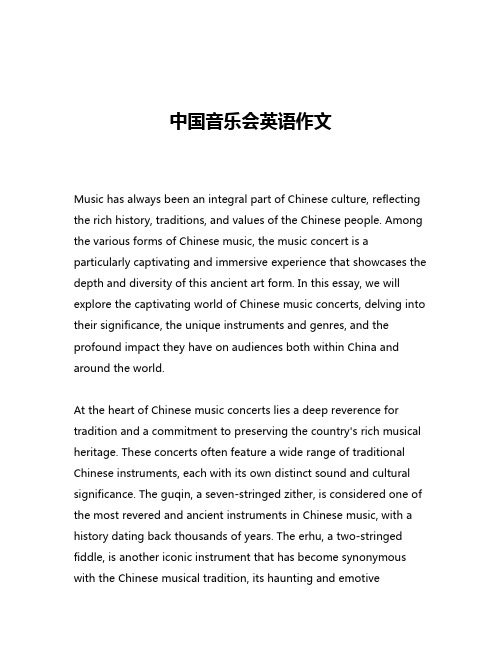
中国音乐会英语作文Music has always been an integral part of Chinese culture, reflecting the rich history, traditions, and values of the Chinese people. Among the various forms of Chinese music, the music concert is a particularly captivating and immersive experience that showcases the depth and diversity of this ancient art form. In this essay, we will explore the captivating world of Chinese music concerts, delving into their significance, the unique instruments and genres, and the profound impact they have on audiences both within China and around the world.At the heart of Chinese music concerts lies a deep reverence for tradition and a commitment to preserving the country's rich musical heritage. These concerts often feature a wide range of traditional Chinese instruments, each with its own distinct sound and cultural significance. The guqin, a seven-stringed zither, is considered one of the most revered and ancient instruments in Chinese music, with a history dating back thousands of years. The erhu, a two-stringed fiddle, is another iconic instrument that has become synonymous with the Chinese musical tradition, its haunting and emotivemelodies captivating audiences worldwide.Beyond the traditional instruments, Chinese music concerts also showcase a diverse array of musical genres, each with its own unique characteristics and cultural roots. From the soulful and contemplative melodies of classical Chinese opera to the dynamic and rhythmic tunes of folk music, these concerts offer a glimpse into the rich tapestry of Chinese musical expression. The incorporation of contemporary and fusion elements in some Chinese music concerts further highlights the adaptability and evolution of this art form, as it seamlessly blends traditional elements with modern influences.One of the most captivating aspects of Chinese music concerts is the sheer virtuosity and technical mastery displayed by the performers. These musicians have often dedicated years, if not decades, to perfecting their craft, honing their skills with unwavering dedication and passion. The intricate techniques required to play traditional Chinese instruments, such as the delicate finger movements and the precise control of breath and bow, are a testament to the depth of musical knowledge and discipline that these artists possess.Moreover, Chinese music concerts are not merely a showcase of musical talent but also a profound cultural experience. These performances often incorporate elements of traditional Chinese theater, dance, and storytelling, creating a multisensory experiencethat transports the audience to the heart of Chinese civilization. The elaborate costumes, the graceful movements of the performers, and the evocative narratives woven into the music all contribute to the immersive and transformative nature of these concerts.Beyond the stage, Chinese music concerts also play a vital role in preserving and promoting the country's rich musical heritage. These events serve as platforms for the younger generation to learn about and engage with their cultural traditions, fostering a sense of pride and connection to their roots. Additionally, the international acclaim and recognition garnered by these concerts have helped to bring Chinese music to the global stage, introducing it to audiences around the world and fostering cross-cultural understanding and appreciation.The impact of Chinese music concerts extends far beyond the realm of music itself. These performances have the power to evoke profound emotions, to transport listeners to different times and places, and to inspire a deeper understanding and appreciation of Chinese culture. Whether it is the haunting melodies of the erhu, the intricate rhythms of traditional percussion, or the soaring vocals of Chinese opera, these concerts have the ability to touch the hearts and minds of audiences, leaving an indelible mark on those who experience them.In conclusion, Chinese music concerts are a captivating and multifaceted cultural experience that showcase the depth and diversity of this ancient art form. From the virtuosic performances of traditional instruments to the integration of contemporary elements, these concerts offer a window into the rich musical heritage of China. By preserving and promoting this cultural legacy, Chinese music concerts play a vital role in fostering cross-cultural understanding and appreciation, inspiring audiences both within China and around the world to explore the boundless beauty and complexity of Chinese music.。
带着音乐去旅行作文
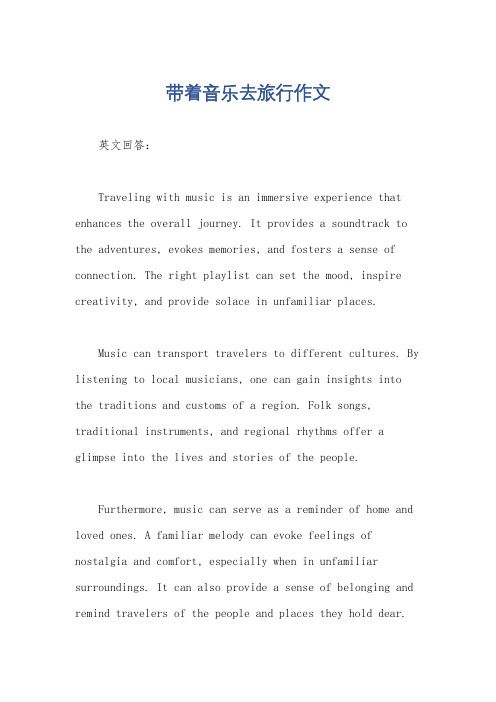
带着音乐去旅行作文英文回答:Traveling with music is an immersive experience that enhances the overall journey. It provides a soundtrack to the adventures, evokes memories, and fosters a sense of connection. The right playlist can set the mood, inspire creativity, and provide solace in unfamiliar places.Music can transport travelers to different cultures. By listening to local musicians, one can gain insights into the traditions and customs of a region. Folk songs, traditional instruments, and regional rhythms offer a glimpse into the lives and stories of the people.Furthermore, music can serve as a reminder of home and loved ones. A familiar melody can evoke feelings of nostalgia and comfort, especially when in unfamiliar surroundings. It can also provide a sense of belonging and remind travelers of the people and places they hold dear.For solitary travelers, music can offer companionship and a sense of community. Whether it's listening to podcasts, audiobooks, or engaging in virtual music sessions, music can foster a sense of connection and combat feelingsof isolation.In addition to enhancing the travel experience, music can also have therapeutic benefits. Listening to calming tunes can reduce stress and anxiety, promoting relaxation and well-being. Music can also stimulate the release of endorphins, which have mood-boosting effects.However, it's important to consider the local customs and regulations when using music while traveling. In some cultures, public displays of music may be frowned upon, especially in sacred or residential areas. Respecting local etiquette and being mindful of noise levels ensures a harmonious travel experience.Overall, traveling with music can enrich the experience in numerous ways. It provides a soundtrack to the journey,evokes memories, fosters a sense of connection, offers companionship, and has therapeutic benefits. By incorporating music into their travels, individuals can create a more immersive and fulfilling experience.中文回答:带着音乐去旅行是一种沉浸式的体验,它能让整个旅程变得更加丰富。
我想一个中国声乐作文英文
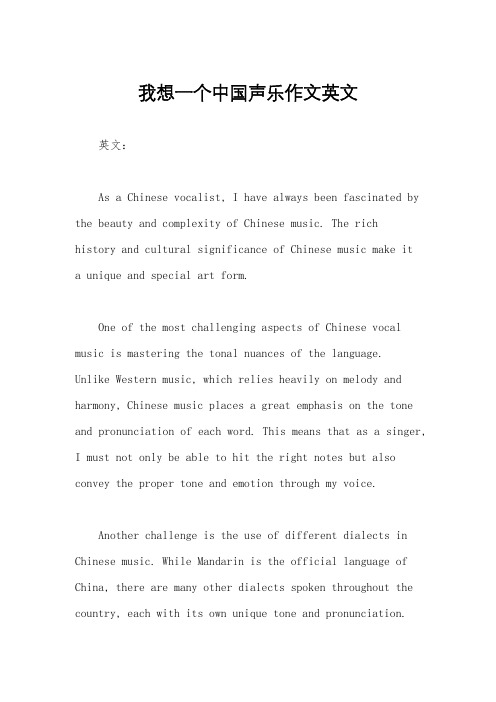
我想一个中国声乐作文英文英文:As a Chinese vocalist, I have always been fascinated by the beauty and complexity of Chinese music. The richhistory and cultural significance of Chinese music make ita unique and special art form.One of the most challenging aspects of Chinese vocal music is mastering the tonal nuances of the language.Unlike Western music, which relies heavily on melody and harmony, Chinese music places a great emphasis on the tone and pronunciation of each word. This means that as a singer, I must not only be able to hit the right notes but also convey the proper tone and emotion through my voice.Another challenge is the use of different dialects in Chinese music. While Mandarin is the official language of China, there are many other dialects spoken throughout the country, each with its own unique tone and pronunciation.As a singer, I must be able to adapt to these dialects and convey the proper emotion and meaning in each one.Despite these challenges, I find Chinese vocal music to be incredibly rewarding. It allows me to connect with my cultural heritage and express myself in a way that is both personal and universal. Through my music, I hope to sharethe beauty and complexity of Chinese culture with the world.中文:作为一名中国声乐家,我一直被中国音乐的美丽和复杂性所吸引。
A Musical Voyage To China(一个中国音乐的旅行)

04. Ricefield Chorus (6:00)
05. Yellow Riverthoughts (6:52)
06. Palace of Eternal Spring (6:19)
07. Echo Wallsong (5:53)
Жанр: Folk Ambient
Год выпуска диска: 1998
Производитель диска: E.U.
Аудио кодек: APE
Тип рипа: image+.cue
Битрейт аудио: lossless
Продолжительность: 61' 37"
03. Yangzi Waterballet [0:05:25.22]
04. Ricefield Chorus [0:06:00.42]
05. Yellow Riverthoughts [0:06:52.10]
06. Palace Of Eternal Spring [0:06:19.32]
Китай - жемчужина Азии. "Срединное государство".
Страна богатая природой, культурой, наполненная
невероятным количеством народностей, религий и традиций.
专辑英文名: A Musical Voyage To China
艺术家: Yeskim
音乐类型: 其他
资源格式: APE
音乐旅行怎么写英语作文
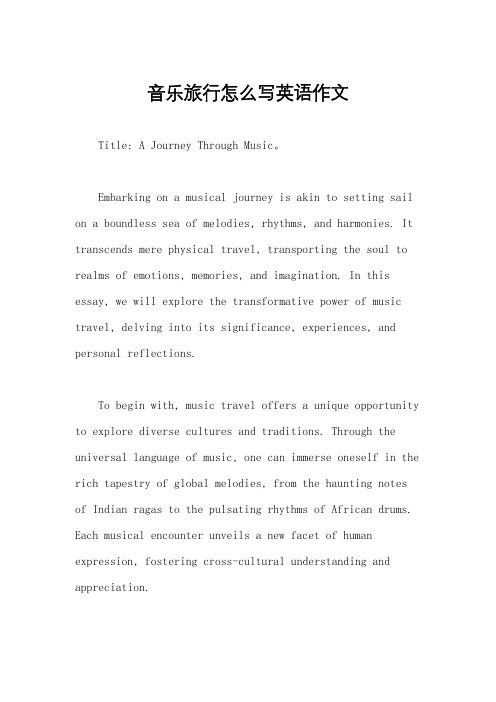
音乐旅行怎么写英语作文Title: A Journey Through Music。
Embarking on a musical journey is akin to setting sail on a boundless sea of melodies, rhythms, and harmonies. It transcends mere physical travel, transporting the soul to realms of emotions, memories, and imagination. In this essay, we will explore the transformative power of music travel, delving into its significance, experiences, and personal reflections.To begin with, music travel offers a unique opportunity to explore diverse cultures and traditions. Through the universal language of music, one can immerse oneself in the rich tapestry of global melodies, from the haunting notes of Indian ragas to the pulsating rhythms of African drums. Each musical encounter unveils a new facet of human expression, fostering cross-cultural understanding and appreciation.Moreover, music travel serves as a catalyst for personal growth and self-discovery. As we venture beyond familiar tunes and genres, we confront our preconceptions and broaden our musical horizons. Whether attending a classical concert in Vienna or jamming with local musicians in a bustling street market, each experience leaves an indelible mark on our musical identity, shaping our tastes and preferences.Furthermore, music travel fosters connections and fosters a sense of community. In shared moments of musical bliss, strangers become friends, united by a common passion for melody and rhythm. Whether singing along at a rock concert or dancing to the beat at a music festival, we forge bonds that transcend language and cultural barriers, celebrating our shared humanity.Reflecting on my own musical journey, I am reminded of the countless moments of wonder and enchantment that have enriched my life. From the ethereal beauty of a Mozart sonata to the raw energy of a jazz improvisation, each encounter has left an indelible imprint on my soul, fuelingmy creativity and igniting my imagination.In conclusion, music travel is not merely a physical journey, but a voyage of the spirit. It opens doors to new worlds, fosters personal growth, and fosters connections that transcend borders and boundaries. As we navigate the vast expanse of musical expression, let us savor each moment, knowing that the true magic of music lies not in its destination, but in the journey itself.。
介绍中国一首古典音乐英语作文
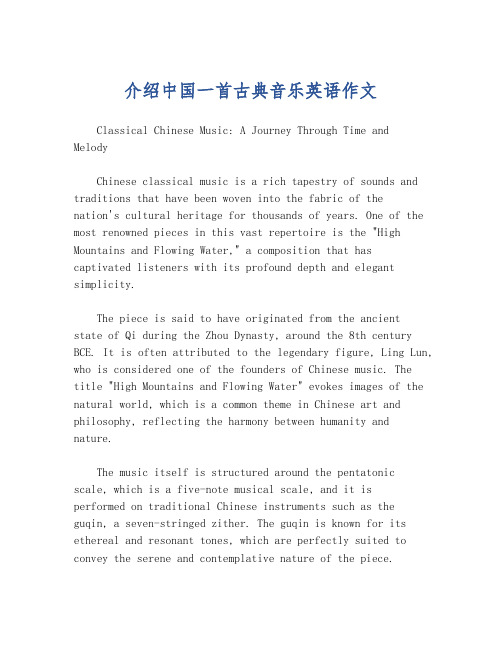
介绍中国一首古典音乐英语作文Classical Chinese Music: A Journey Through Time andMelodyChinese classical music is a rich tapestry of sounds and traditions that have been woven into the fabric of thenation's cultural heritage for thousands of years. One of the most renowned pieces in this vast repertoire is the "High Mountains and Flowing Water," a composition that hascaptivated listeners with its profound depth and elegant simplicity.The piece is said to have originated from the ancientstate of Qi during the Zhou Dynasty, around the 8th century BCE. It is often attributed to the legendary figure, Ling Lun, who is considered one of the founders of Chinese music. Thetitle "High Mountains and Flowing Water" evokes images of the natural world, which is a common theme in Chinese art and philosophy, reflecting the harmony between humanity and nature.The music itself is structured around the pentatonic scale, which is a five-note musical scale, and it isperformed on traditional Chinese instruments such as the guqin, a seven-stringed zither. The guqin is known for its ethereal and resonant tones, which are perfectly suited to convey the serene and contemplative nature of the piece.As the music unfolds, it takes the listener on a journey through the Chinese landscape, with melodies that rise and fall like the peaks of mountains and the gentle flow of a river. The composition is not only a musical masterpiece but also a philosophical statement, symbolizing the friendship and understanding between individuals, as the story goes that it was composed to celebrate the bond between the philosopher Yu Boya and his woodcutter friend Zhong Ziqi.The "High Mountains and Flowing Water" has been passed down through generations, with each musician adding their own interpretation and nuances to the piece. This tradition of continuous adaptation and evolution is a testament to the living nature of Chinese classical music, which remains as vibrant and relevant today as it was in ancient times.In the modern era, the piece has been arranged and performed by various ensembles, sometimes incorporating Western instruments to create a fusion of Eastern and Western musical traditions. It has also been used in film scores and has been sent into space as part of a collection of music representing humanity's cultural achievements.The "High Mountains and Flowing Water" stands as a beacon of Chinese classical music, offering a window into the soul of a nation and its enduring connection to the natural world. It is a piece that transcends time and space, inviting all who listen to lose themselves in the timeless beauty of its melodies and the wisdom of its age-old message.。
davif想学习中国传统乐器的英语作文

davif想学习中国传统乐器的英语作文Davif's Journey to Explore Chinese Traditional InstrumentsDavif had always been fascinated by the rich cultural heritage of China, and as he grew older, his interest in the country's traditional music only deepened. One day, while browsing through a book on Chinese culture, he came across a mesmerizing description of the guqin, a seven-stringed zither that had been played by scholars and nobles for centuries. Intrigued, Davif decided that he must learn to play this instrument and immerse himself in the world of Chinese traditional music.With a newfound determination, Davif began to research the guqin and its history. He learned that the instrument was considered one of the four essential arts of the Chinese scholar-gentleman, along with calligraphy, painting, and chess. The guqin was not just a musical instrument but a symbol of refinement, introspection, and connection with the natural world. Davif was captivated by the idea of mastering an art form that had such deep cultural significance.Eager to begin his journey, Davif reached out to a renowned guqin master in China, hoping to arrange for lessons. To his delight, themaster agreed to take him on as a student, provided that Davif was willing to dedicate himself fully to the study of the instrument. Davif enthusiastically accepted the offer, and soon found himself on a plane bound for China, his heart racing with excitement and anticipation.Upon arriving in the ancient city of Hangzhou, Davif was greeted by his guqin teacher, a soft-spoken and patient man who had been playing the instrument for over five decades. The teacher welcomed Davif into his home, which was adorned with scrolls of calligraphy and paintings depicting the natural landscapes that had inspired so many guqin compositions.Over the following weeks, Davif immersed himself in the study of the guqin, spending hours each day practicing the intricate fingerings and mastering the delicate techniques required to coax out the instrument's rich, resonant tones. He learned about the different playing styles, each with its own unique character and expressive qualities, and he explored the vast repertoire of guqin pieces, from serene and contemplative melodies to lively and virtuosic works.As Davif's skills grew, he began to appreciate the deeper layers of meaning and symbolism inherent in the guqin. The instrument was not merely a tool for making music but a means of cultivating the self, of connecting with the natural world, and of expressing theinnermost thoughts and emotions of the player. Davif found himself drawn into a world of profound artistic and philosophical exploration, one that challenged him to think deeply about the nature of beauty, the role of the artist in society, and the universal human experience.Alongside his guqin lessons, Davif also immersed himself in the study of Chinese culture more broadly. He attended lectures on the history of Chinese music, visited museums to learn about the evolution of traditional instruments, and even took classes in Chinese calligraphy and painting. With each new experience, Davif's understanding and appreciation of Chinese culture deepened, and he found himself increasingly captivated by the richness and complexity of this ancient civilization.As the months passed, Davif's dedication to the guqin only grew stronger. He spent hours each day practicing, often losing track of time as he became absorbed in the music. His teacher marveled at his progress, noting that Davif had a natural talent and a deep passion for the instrument. Davif, in turn, was humbled by the depth of knowledge and skill that his teacher possessed, and he worked tirelessly to emulate the master's fluid and expressive playing.One day, as Davif was practicing a particularly challenging piece, his teacher approached him with an unexpected proposition. The teacher had been invited to perform at a prestigious concert hall inBeijing, and he wanted Davif to join him as a special guest performer. Davif was stunned, his heart racing with a mix of excitement and trepidation. He had never performed in public before, and the thought of playing the guqin in front of a large audience was both thrilling and daunting.After much deliberation, Davif accepted the offer, determined to rise to the challenge. In the weeks leading up to the performance, he practiced relentlessly, pouring his heart and soul into every note. When the day of the concert arrived, Davif felt a mixture of nerves and anticipation as he took the stage alongside his teacher. As he began to play, however, all of his worries melted away, and he became lost in the music, his fingers dancing across the strings with a newfound confidence and grace.The audience was captivated, their rapt attention a testament to the power and beauty of the guqin. When Davif's performance came to an end, the crowd erupted in thunderous applause, and he felt a surge of pride and accomplishment that he had never experienced before. In that moment, Davif knew that his journey with the guqin was only just beginning, and he was eager to continue exploring the depths of this ancient and revered instrument.As he returned to his home, Davif reflected on the transformative experience of learning the guqin. What had started as a simplecuriosity had blossomed into a deep and abiding passion, one that had not only enriched his understanding of Chinese culture but also touched his very soul. He knew that the guqin would forever hold a special place in his heart, a constant reminder of the power of music to transcend cultural boundaries and connect people from all walks of life.。
介绍中国音乐历史英语作文
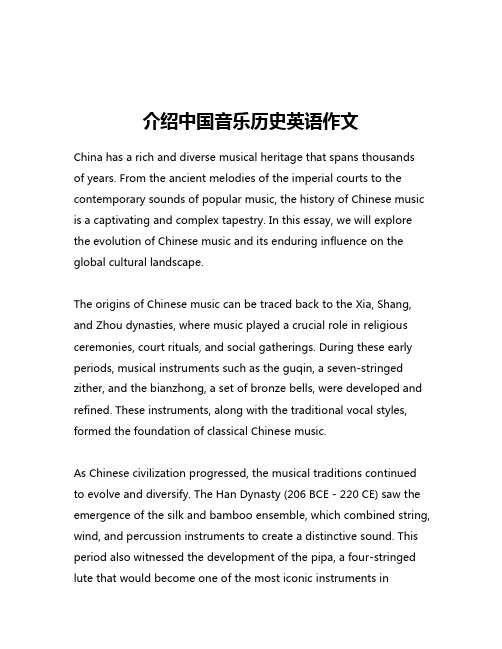
介绍中国音乐历史英语作文China has a rich and diverse musical heritage that spans thousandsof years. From the ancient melodies of the imperial courts to the contemporary sounds of popular music, the history of Chinese music is a captivating and complex tapestry. In this essay, we will explore the evolution of Chinese music and its enduring influence on the global cultural landscape.The origins of Chinese music can be traced back to the Xia, Shang, and Zhou dynasties, where music played a crucial role in religious ceremonies, court rituals, and social gatherings. During these early periods, musical instruments such as the guqin, a seven-stringed zither, and the bianzhong, a set of bronze bells, were developed and refined. These instruments, along with the traditional vocal styles, formed the foundation of classical Chinese music.As Chinese civilization progressed, the musical traditions continued to evolve and diversify. The Han Dynasty (206 BCE - 220 CE) saw the emergence of the silk and bamboo ensemble, which combined string, wind, and percussion instruments to create a distinctive sound. This period also witnessed the development of the pipa, a four-stringed lute that would become one of the most iconic instruments inChinese music.The Tang Dynasty (618 - 907 CE) is often referred to as the "Golden Age" of Chinese music. During this time, the court music, known as yayue, reached its pinnacle, with elaborate orchestras and a rich repertoire that incorporated influences from Central Asia and the Middle East. The Tang Dynasty also saw the rise of popular music genres, such as the ci and qu, which blended poetry and music to create a more accessible form of entertainment.The Song Dynasty (960 - 1279 CE) witnessed a further refinement of classical Chinese music, with the development of the guqin repertoire and the emergence of the Kunqu opera, a highly stylized form of musical theater. The Ming (1368 - 1644 CE) and Qing (1644 - 1912 CE) dynasties continued this tradition, with the Peking opera and the Cantonese opera gaining prominence and becoming integral parts of Chinese cultural identity.The 20th century brought about significant changes in the landscape of Chinese music. With the establishment of the People's Republic of China in 1949, the government sought to promote a new socialist music that would serve the needs of the people. This led to the creation of revolutionary songs, military marches, and folk music adaptations that reflected the ideological goals of the Communist Party.However, the Cultural Revolution (1966 - 1976) had a devastating impact on traditional Chinese music, as many classical forms were denounced as "feudal" and "bourgeois." During this turbulent period, many musicians were persecuted, and traditional instruments were banned or destroyed. Despite these challenges, the resilience of Chinese music prevailed, and the post-Mao era saw a gradual revival and reinterpretation of traditional musical forms.In the contemporary era, Chinese music has undergone a remarkable renaissance, with a diverse array of genres and styles emerging. The influence of Western music, combined with the rich heritage of Chinese traditions, has given rise to a vibrant and evolving musical landscape. From the fusion of classical Chinese instruments with contemporary Western styles to the global success of K-pop and Mandopop, Chinese music has continued to captivate audiences around the world.The history of Chinese music is a testament to the enduring power of cultural expression and the ability of music to transcend borders and connect people. As China continues to play a pivotal role on the global stage, its musical traditions will undoubtedly continue to evolve and inspire new generations of musicians and listeners alike. The story of Chinese music is a complex and captivating one, and itsinfluence on the world's cultural tapestry is a testament to the enduring spirit of human creativity and expression.。
关于中国音乐的英语高一作文
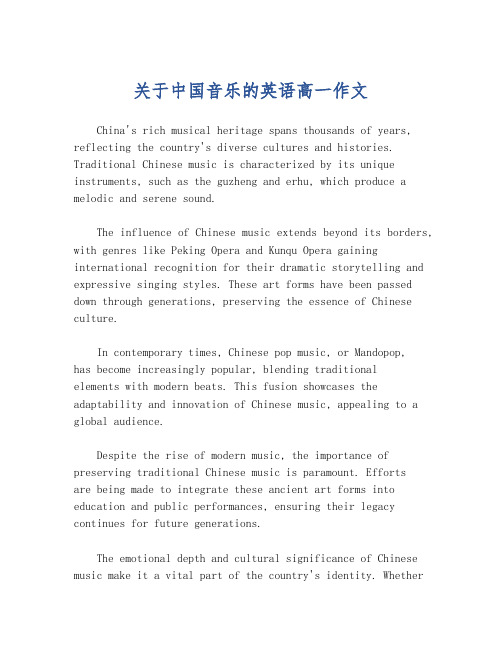
关于中国音乐的英语高一作文China's rich musical heritage spans thousands of years, reflecting the country's diverse cultures and histories. Traditional Chinese music is characterized by its unique instruments, such as the guzheng and erhu, which produce a melodic and serene sound.The influence of Chinese music extends beyond its borders, with genres like Peking Opera and Kunqu Opera gaining international recognition for their dramatic storytelling and expressive singing styles. These art forms have been passed down through generations, preserving the essence of Chinese culture.In contemporary times, Chinese pop music, or Mandopop,has become increasingly popular, blending traditionalelements with modern beats. This fusion showcases the adaptability and innovation of Chinese music, appealing to a global audience.Despite the rise of modern music, the importance of preserving traditional Chinese music is paramount. Effortsare being made to integrate these ancient art forms into education and public performances, ensuring their legacy continues for future generations.The emotional depth and cultural significance of Chinese music make it a vital part of the country's identity. Whetherit's the soothing tones of a guqin or the vibrant rhythms of a modern pop song, the music of China speaks to the soul.As China continues to evolve, its music scene is expected to flourish, with new genres and styles emerging. This evolution will undoubtedly contribute to the dynamic tapestry of Chinese culture, enriching the world's musical landscape.In conclusion, Chinese music is a testament to the country's enduring creativity and cultural depth. From ancient melodies to modern hits, it continues to captivate and inspire, serving as a bridge between the past and the present.。
中国古典音乐节的活动英语作文

中国古典音乐节的活动英语作文The enchanting sounds of traditional Chinese music filled the air as the China Classical Music Festival kicked off in grand style. This celebration of ancient melodies and harmonies is a feast for the ears, offering a unique window into the rich cultural heritage of China. The festival, which attracts enthusiasts from around the globe, features a diverse lineup of performances that span the breadth of Chinese musical tradition, from the ethereal tones of the guzheng to the resonant beats of the drums.The event is not just a concert but a journey through time, showcasing the evolution of Chinese music through historical eras. Attendees are treated to a variety of performances, including solo recitals, orchestral pieces, and ensemble presentations, each with its own story and cultural significance. The festival also serves as a platform for up-and-coming artists to showcase their talents alongside seasoned maestros.One of the highlights of the festival is the interactive workshops, where attendees can learn to play traditional instruments or participate in a hands-on experience of Chinese music composition. These workshops are not only educational but also foster a deeper appreciation for the artistry involved in crafting these timeless tunes.The festival's organizers have made a concerted effort toblend the old with the new, incorporating modern elementsinto the performances to engage a younger audience. This fusion of tradition and contemporary flair has been met with resounding success, ensuring that the festival is as relevant and vibrant as the music it celebrates.As the notes drift through the air, they carry with them the spirit of a nation's past, present, and future. The China Classical Music Festival is more than just an event; it's a testament to the enduring power of music to connect hearts and cultures across the world.。
中国民乐英语作文80词
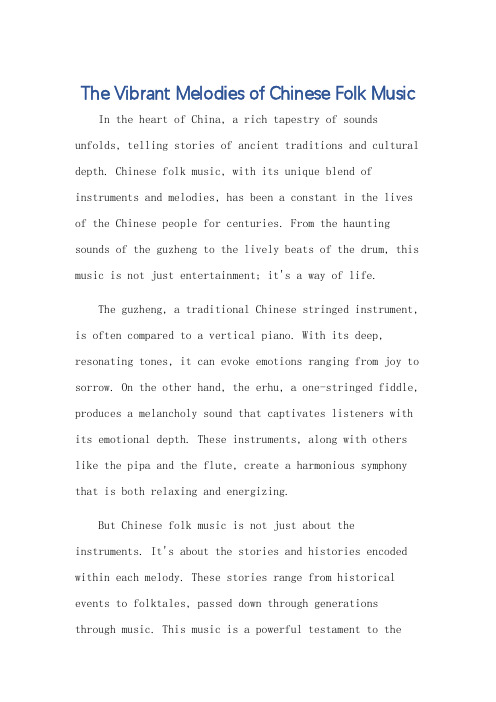
The Vibrant Melodies of Chinese Folk Music In the heart of China, a rich tapestry of sounds unfolds, telling stories of ancient traditions and cultural depth. Chinese folk music, with its unique blend of instruments and melodies, has been a constant in the lives of the Chinese people for centuries. From the haunting sounds of the guzheng to the lively beats of the drum, this music is not just entertainment; it's a way of life.The guzheng, a traditional Chinese stringed instrument, is often compared to a vertical piano. With its deep, resonating tones, it can evoke emotions ranging from joy to sorrow. On the other hand, the erhu, a one-stringed fiddle, produces a melancholy sound that captivates listeners with its emotional depth. These instruments, along with others like the pipa and the flute, create a harmonious symphony that is both relaxing and energizing.But Chinese folk music is not just about the instruments. It's about the stories and histories encoded within each melody. These stories range from historical events to folktales, passed down through generations through music. This music is a powerful testament to theresilience and adaptability of Chinese culture, thriving despite changes in time and technology.In conclusion, Chinese folk music is not just a form of entertainment; it's a cultural icon that represents the essence of Chinese heritage. It's a musical journey through time, allowing listeners to connect with their ancestorsand understand the rich tapestry of Chinese culture.**中国民乐的活力旋律**在中国的心脏地带,一段段声音的丰富织锦展开,讲述着古老传统和文化深度的故事。
对中国传统音乐感兴趣英语作文

对中国传统音乐感兴趣英语作文Discovering the Enchanting World of Traditional Chinese Music Growing up in the West, my exposure to Chinese culture was limited. However, that all changed when I stumbled upon a mesmerizing performance of traditional Chinese music. The haunting melodies of the erhu, the delicate strums of the guzheng, and the powerful beats of the tanggu drum ignited a spark within me.I became determined to delve deeper into this rich musical heritage.As I began my journey of exploration, I was amazed by the diversity and history of Chinese folk and classical music. Each region had its own distinct musical styles, instruments, and songs that reflected the local culture and customs. From the lively Jiangnan Sizhu of the south to the enchanting Mongolian Khoomei of the north, I was transported across China's vast landscapes through music.What captivated me the most was how Chinese music seamlessly blends poetry, storytelling, and emotions. Ancient tales of love, loss, and triumph came alive through expressive performances. Listening to a skilled musician paint vivid imagery and convey profound feelings through their instrument was a transcendent experience.Driven by my growing passion, I sought out opportunities to learn from master musicians. Attending workshops and immersing myself in the community allowed me to gain a deeper appreciation for the dedication and artistry behind each note. As I tried my hand at playing the guzheng, I developed a profoundrespect for the discipline and soul poured into mastering these ancient instruments.Traditional Chinese music has become an integral part of my life, connecting me to a civilization's heritage and enriching my understanding of the world. It has taught me the power of music to bridge cultures, evoke emotions, and tell timeless stories. As I continue on this enchanting journey, I am excited to share my love for Chinese music with others, inviting them to discover the beauty and depth of this magnificent art form.中文翻译:探索传统中国音乐的迷人世界在西方长大的我,对中国文化的接触十分有限。
以中国传统音乐为主题的英语作文高中
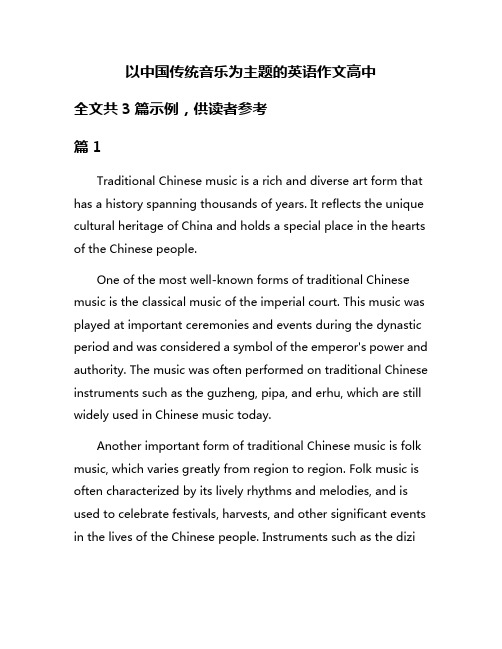
以中国传统音乐为主题的英语作文高中全文共3篇示例,供读者参考篇1Traditional Chinese music is a rich and diverse art form that has a history spanning thousands of years. It reflects the unique cultural heritage of China and holds a special place in the hearts of the Chinese people.One of the most well-known forms of traditional Chinese music is the classical music of the imperial court. This music was played at important ceremonies and events during the dynastic period and was considered a symbol of the emperor's power and authority. The music was often performed on traditional Chinese instruments such as the guzheng, pipa, and erhu, which are still widely used in Chinese music today.Another important form of traditional Chinese music is folk music, which varies greatly from region to region. Folk music is often characterized by its lively rhythms and melodies, and is used to celebrate festivals, harvests, and other significant events in the lives of the Chinese people. Instruments such as the dizi(bamboo flute) and yangqin (hammered dulcimer) are commonly used in folk music performances.In addition to court and folk music, traditional Chinese opera is also a popular form of music and theater. Traditional Chinese opera combines music, dance, and drama to tell stories from Chinese history and mythology. The performers wear elaborate costumes and makeup, and use a unique style of singing known as "jingju" to convey emotion and character.In recent years, there has been a renewed interest in traditional Chinese music, both within China and internationally. Many young musicians are studying traditional Chinese instruments and incorporating traditional music elements into contemporary music styles. Traditional Chinese music festivals and concerts are also becoming more popular, attracting audiences from around the world.Overall, traditional Chinese music is a vital part of China's cultural heritage and continues to be an important form of artistic expression. Its beauty and complexity have captivated audiences for centuries, and its influence can be seen in the modern music scene. As China continues to evolve and change, traditional Chinese music will undoubtedly continue to play a significant role in the country's cultural landscape.篇2Chinese traditional music has a rich history and profound cultural significance. With a history spanning thousands of years, Chinese traditional music has evolved into a diverse and vibrant art form that continues to captivate audiences around the world. From ancient court music to modern folk songs, Chinese traditional music reflects the cultural heritage and artistic achievements of the Chinese people.One of the distinctive features of Chinese traditional music is its use of traditional instruments such as the guqin, pipa, erhu, and dizi. These instruments have been played for centuries and are an integral part of Chinese music culture. Each instrument has a unique sound and playing technique, and when played together, they create a harmonious and beautiful melody that is both soothing and uplifting.In addition to traditional instruments, Chinese traditional music also incorporates elements of poetry, calligraphy, and painting. Many traditional Chinese songs are inspired by ancient poems and literary works, and the lyrics often evoke images of nature, love, and the human experience. Calligraphy and painting are also important influences on Chinese music, as theyare used to create the visual imagery that accompanies musical performances.Chinese traditional music is also deeply rooted in Chinese philosophy and spirituality. Many traditional Chinese songs are based on ancient philosophical concepts such as Confucianism, Taoism, and Buddhism. These songs often convey moral lessons and spiritual teachings through their lyrics and melodies, making them not only beautiful to listen to but also thought-provoking and emotionally evocative.In recent years, Chinese traditional music has experienced a resurgence in popularity both in China and abroad. With the rise of globalization and the popularity of cultural exchange programs, Chinese traditional music has found a new audience among young people and music enthusiasts from around the world. Many Chinese traditional music ensembles and performers have gained international acclaim, and traditional Chinese music festivals and concerts are held regularly in major cities worldwide.As Chinese traditional music continues to evolve and adapt to the changing times, it remains an important part of Chinese cultural heritage and a source of pride for the Chinese people. By preserving and promoting traditional music, we can ensure thatfuture generations will continue to appreciate and celebrate the beauty and richness of Chinese traditional music for years to come.篇3Chinese traditional music, as a vital part of Chinese culture, has a long history and rich heritage. It reflects the ethos, customs, and values of the Chinese people and serves as a bridge connecting the past and the present. In this essay, we will delve into the essence of Chinese traditional music, its key features, and its impact on Chinese society.Chinese traditional music encompasses a wide range of genres, such as folk music, opera music, court music, and classical music. One of the most notable characteristics of Chinese traditional music is its emphasis on melody. Unlike Western music, which focuses on harmony and counterpoint, Chinese traditional music places a strong emphasis on the beauty and expressiveness of the melody. This emphasis on melody can be seen in the use of pentatonic scales, which are a hallmark of Chinese music. The use of pentatonic scales gives Chinese traditional music a distinctive sound that sets it apart from Western music.Another key feature of Chinese traditional music is its use of traditional Chinese instruments. These instruments, such as the guqin, pipa, erhu, and dizi, have been played in China for centuries and are an integral part of Chinese musical culture. Each instrument has its own unique sound and playing techniques, which contribute to the richness and diversity of Chinese traditional music.Chinese traditional music also plays a significant role in Chinese society. It is often performed at important ceremonies and celebrations, such as weddings, funerals, and festivals. In addition, Chinese traditional music is used as a form of entertainment, with performances taking place in theaters, teahouses, and other public venues. Chinese traditional music also has a spiritual dimension, with certain pieces of music being associated with Confucianism, Buddhism, Taoism, and other Chinese religious traditions.In recent years, there has been a renewed interest in Chinese traditional music both in China and abroad. Chinese traditional music has gained popularity among young people, who are rediscovering the beauty and complexity of this ancient art form. In addition, Chinese traditional music has been embraced bymusicians from around the world, who are incorporating Chinese musical elements into their own compositions.Overall, Chinese traditional music is a treasure trove of cultural heritage that reflects the history, values, and spirit of the Chinese people. By preserving and promoting Chinese traditional music, we can ensure that this rich musical tradition continues to thrive for generations to come.。
中国古典音乐的英文作文
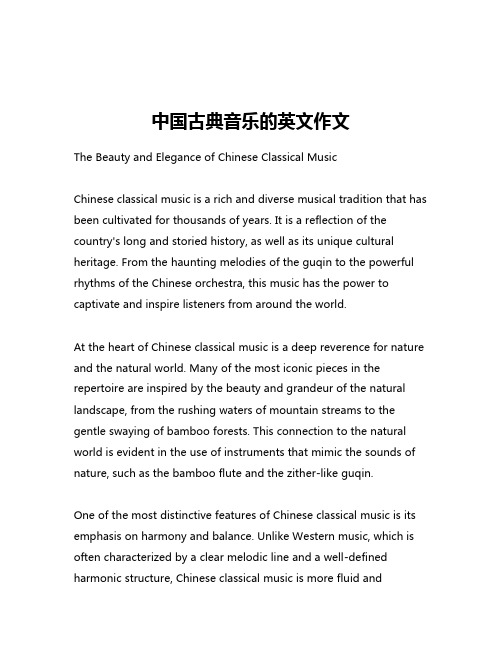
中国古典音乐的英文作文The Beauty and Elegance of Chinese Classical MusicChinese classical music is a rich and diverse musical tradition that has been cultivated for thousands of years. It is a reflection of the country's long and storied history, as well as its unique cultural heritage. From the haunting melodies of the guqin to the powerful rhythms of the Chinese orchestra, this music has the power to captivate and inspire listeners from around the world.At the heart of Chinese classical music is a deep reverence for nature and the natural world. Many of the most iconic pieces in the repertoire are inspired by the beauty and grandeur of the natural landscape, from the rushing waters of mountain streams to the gentle swaying of bamboo forests. This connection to the natural world is evident in the use of instruments that mimic the sounds of nature, such as the bamboo flute and the zither-like guqin.One of the most distinctive features of Chinese classical music is its emphasis on harmony and balance. Unlike Western music, which is often characterized by a clear melodic line and a well-defined harmonic structure, Chinese classical music is more fluid andimprovisational. The musicians often use techniques like pitch bending and microtonal variations to create a sense of subtle and ever-changing harmonies.This emphasis on harmony and balance is also reflected in the structure of Chinese classical music. Many pieces are based on a series of interconnected melodic phrases, rather than a single, dominant melody. This allows the music to flow and evolve in a more organic and natural way, with each instrument or voice contributing to the overall tapestry of sound.Another key aspect of Chinese classical music is its deep connection to the country's rich literary and philosophical traditions. Many of the most famous pieces in the repertoire are based on classic Chinese poems or stories, and the musicians often draw on the imagery and symbolism of these works to inform their musical interpretations.For example, the guqin piece "Flowing Water" is inspired by the famous poem of the same name, which describes the gentle flow of a mountain stream. The musician's task is to capture the essence of this natural scene through the subtle and evocative use of the instrument's strings and resonances.Similarly, the Chinese orchestra piece "Autumn Moon on a Calm Lake" is inspired by the serene and contemplative mood of a moonlitlake in autumn. The musicians use a variety of instruments, including the erhu (a two-stringed fiddle) and the pipa (a four-stringed lute), to create a haunting and atmospheric soundscape that evokes the beauty and tranquility of the natural world.In addition to its connection to literature and philosophy, Chinese classical music is also deeply rooted in the country's rich cultural traditions. Many of the most important pieces in the repertoire are associated with specific rituals or ceremonies, such as the performance of the guqin during Confucian ceremonies or the use of the Chinese orchestra in imperial court music.This deep cultural connection has helped to ensure the ongoing vitality and relevance of Chinese classical music, even in the face of rapid social and technological change. Today, this music continues to be studied and performed by musicians and scholars around the world, who are drawn to its unique blend of technical virtuosity, emotional expressiveness, and cultural significance.Despite the many challenges and changes that have shaped the course of Chinese history, the enduring power and beauty of Chinese classical music remains a testament to the resilience and creativity of the Chinese people. Whether you are a seasoned listener or a newcomer to this rich musical tradition, there is much to discoverand appreciate in the timeless melodies and harmonies of Chinese classical music.。
中国音乐会的门票英语作文
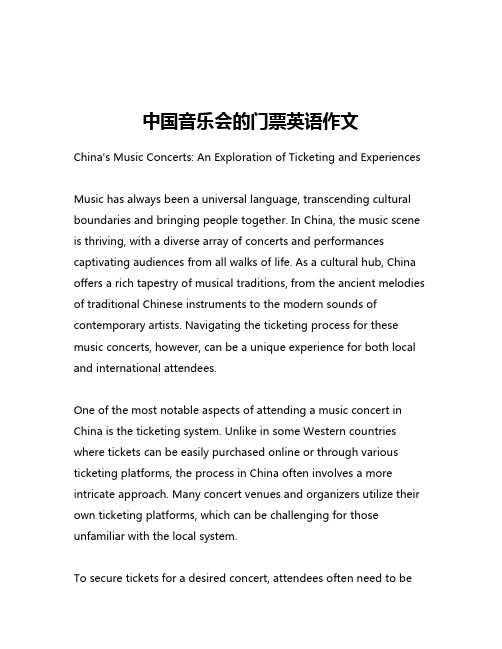
中国音乐会的门票英语作文China's Music Concerts: An Exploration of Ticketing and ExperiencesMusic has always been a universal language, transcending cultural boundaries and bringing people together. In China, the music scene is thriving, with a diverse array of concerts and performances captivating audiences from all walks of life. As a cultural hub, China offers a rich tapestry of musical traditions, from the ancient melodies of traditional Chinese instruments to the modern sounds of contemporary artists. Navigating the ticketing process for these music concerts, however, can be a unique experience for both local and international attendees.One of the most notable aspects of attending a music concert in China is the ticketing system. Unlike in some Western countries where tickets can be easily purchased online or through various ticketing platforms, the process in China often involves a more intricate approach. Many concert venues and organizers utilize their own ticketing platforms, which can be challenging for those unfamiliar with the local system.To secure tickets for a desired concert, attendees often need to beproactive and vigilant. The demand for popular performances can be exceptionally high, leading to tickets selling out within minutes of going on sale. This competitive nature of the ticketing process can be both exciting and frustrating for concertgoers, as they must navigate a complex system to secure their seats.One strategy that has proven effective for many music enthusiasts in China is to closely monitor the official websites and social media accounts of the concert venues and event organizers. These platforms often provide the most up-to-date information on upcoming shows, ticket release dates, and purchasing procedures. By staying informed and being prepared to act quickly, attendees can increase their chances of securing the coveted tickets.Another factor to consider when attending a music concert in China is the venue itself. China boasts a diverse array of concert halls and performance spaces, each with its own unique atmosphere and amenities. From the grand, historic theaters to the modern, state-of-the-art arenas, the venues themselves can contribute significantly to the overall concert experience.Many of the larger concert halls in China, such as the National Centre for the Performing Arts in Beijing or the Shanghai Oriental Art Center, offer a level of grandeur and sophistication that can enhance the musical experience. These venues are often equipped with world-class acoustics, comfortable seating, and state-of-the-art lighting and sound systems, ensuring that the audience is immersed in the performance.At the same time, smaller, more intimate venues can also provide a unique and captivating concert experience. These venues, which may be located in the heart of bustling cities or tucked away in charming neighborhoods, often offer a more personal and immersive atmosphere, allowing the audience to feel a closer connection to the performers.Regardless of the venue, attending a music concert in China is an opportunity to not only enjoy the music but also to immerse oneself in the cultural fabric of the country. Concertgoers may find themselves surrounded by a diverse audience, ranging from music enthusiasts and cultural aficionados to families and young professionals, all united in their appreciation for the art form.One of the most remarkable aspects of attending a music concert in China is the sense of community and shared experience that it fosters. Audience members may engage in lively discussions about the performance, share their impressions, and even participate in traditional Chinese customs, such as the enthusiastic applause and cheering that often accompany the end of a particularly impressive piece.Moreover, the music concerts in China often serve as a platform for cultural exchange and understanding. International artists and performers are frequently invited to showcase their talents, exposing Chinese audiences to diverse musical traditions and genres. This cross-cultural exchange not only enriches the concert experience but also contributes to a deeper appreciation and understanding of the global music landscape.In conclusion, attending a music concert in China is a multifaceted experience that combines the thrill of securing coveted tickets, the grandeur of world-class venues, and the immersion in a vibrant cultural landscape. Despite the challenges of navigating the ticketing system, the rewards of experiencing the country's rich musical heritage and the sense of community that these concerts foster are truly unparalleled. For music enthusiasts and cultural explorers alike, a visit to a Chinese music concert is a must-have experience that promises to leave a lasting impression.。
对中国民歌感兴趣英文作文
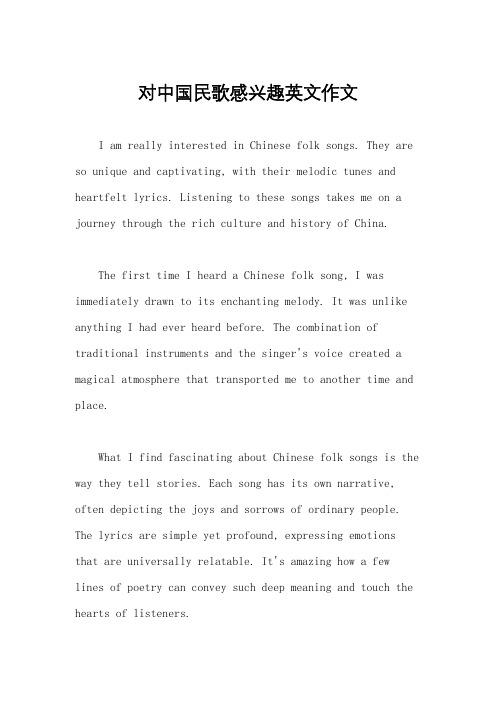
对中国民歌感兴趣英文作文I am really interested in Chinese folk songs. They are so unique and captivating, with their melodic tunes and heartfelt lyrics. Listening to these songs takes me on a journey through the rich culture and history of China.The first time I heard a Chinese folk song, I was immediately drawn to its enchanting melody. It was unlike anything I had ever heard before. The combination of traditional instruments and the singer's voice created a magical atmosphere that transported me to another time and place.What I find fascinating about Chinese folk songs is the way they tell stories. Each song has its own narrative, often depicting the joys and sorrows of ordinary people. The lyrics are simple yet profound, expressing emotionsthat are universally relatable. It's amazing how a fewlines of poetry can convey such deep meaning and touch the hearts of listeners.Another aspect of Chinese folk songs that I find intriguing is the regional diversity. China is a vast country with a rich cultural heritage, and each region has its own unique style of folk music. From the lively and energetic tunes of northern China to the gentle and melodious songs of the south, there is so much variety to explore. It's like diving into a treasure trove of musical treasures.Chinese folk songs also reflect the values and traditions of the Chinese people. They often celebrate the beauty of nature, the importance of family and community, and the struggles and triumphs of everyday life. Through these songs, I gain a deeper understanding of Chinese culture and the values that have shaped its society.Listening to Chinese folk songs is not only a way to appreciate the music itself, but also a way to connect with the people and the stories behind the songs. It's a window into the lives of generations past and a reminder of the timeless themes that resonate with all of us. Whether it'sa joyful celebration or a melancholic lament, Chinese folk songs have a way of touching the soul and leaving a lasting impression.In conclusion, my interest in Chinese folk songs stems from their unique melodies, heartfelt lyrics, regional diversity, cultural significance, and emotional resonance. They are a treasure trove of musical and cultural heritage that deserves to be explored and appreciated. I am grateful for the opportunity to delve into the world of Chinese folk songs and discover the beauty and depth they hold.。
中国音乐英语作文带翻译

中国音乐英语作文带翻译Chinese music, with its rich history and diverse styles, has always been a fascinating subject for me. It is not just a form of art but also a reflection of the country's deep cultural heritage. In this essay, I will explore the various elements of Chinese music and its impact on the world.Firstly, the traditional Chinese music is characterized byits use of unique instruments such as the guzheng, pipa, and erhu. These instruments, with their distinct sounds, create a melodious and serene atmosphere that is instantly recognizable. The guzheng, a plucked string instrument, is known for its ethereal and soothing tones, while the pipa, another string instrument, can produce a wide range of sounds from soft whispers to sharp, resonant notes. The erhu, a two-stringed fiddle, is famous for its ability to mimic the human voice, adding an emotional depth to the music.Secondly, the composition of Chinese music often incorporates elements from nature and philosophy. Many pieces are inspired by the changing seasons, the beauty of landscapes, or the principles of harmony and balance found in Confucian thought. This philosophical aspect of Chinese music sets it apart from other musical traditions and gives it a unique aesthetic value.Moreover, Chinese music has evolved over the centuries, blending traditional elements with modern influences.Contemporary Chinese musicians are experimenting with new sounds and styles, creating a fusion that is both innovative and rooted in tradition. This evolution has led to a broader appreciation and understanding of Chinese music globally.In conclusion, Chinese music is a treasure trove of cultural expression. Its traditional instruments, philosophical compositions, and modern adaptations make it a captivatingart form that continues to enchant audiences worldwide.翻译:中国音乐以其丰富的历史和多样的风格,一直是我非常感兴趣的课题。
寻找中国传统乐器英语作文
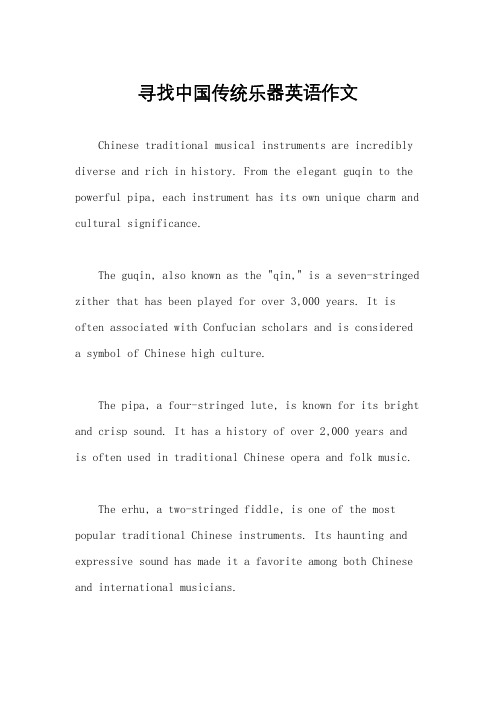
寻找中国传统乐器英语作文Chinese traditional musical instruments are incredibly diverse and rich in history. From the elegant guqin to the powerful pipa, each instrument has its own unique charm and cultural significance.The guqin, also known as the "qin," is a seven-stringed zither that has been played for over 3,000 years. It is often associated with Confucian scholars and is considered a symbol of Chinese high culture.The pipa, a four-stringed lute, is known for its bright and crisp sound. It has a history of over 2,000 years andis often used in traditional Chinese opera and folk music.The erhu, a two-stringed fiddle, is one of the most popular traditional Chinese instruments. Its haunting and expressive sound has made it a favorite among both Chinese and international musicians.The dizi, a bamboo flute, has a history of over 2,000 years and is often used in traditional Chinese folk music. Its clear and melodious tone makes it a versatile instrument for both solo and ensemble performances.The guzheng, a 21-stringed zither, has a history of over 2,500 years and is known for its rich and resonant sound. It is often used in both solo and ensemble performances, as well as in traditional Chinese opera.The suona, a double-reed horn, is often used in traditional Chinese folk music and celebrations. Its loud and bright sound makes it a popular choice for outdoor performances and festive occasions.The sheng, a mouth-blown free reed instrument, has a history of over 3,000 years and is often used intraditional Chinese ensemble music. Its unique sound and versatility make it a staple in Chinese traditional music.In conclusion, Chinese traditional musical instruments are a vital part of the country's cultural heritage. Eachinstrument has its own unique characteristics and history, contributing to the rich tapestry of Chinese music. Whether it's the soothing sound of the guqin or the lively tunes of the suona, these instruments continue to captivate audiences around the world.。
- 1、下载文档前请自行甄别文档内容的完整性,平台不提供额外的编辑、内容补充、找答案等附加服务。
- 2、"仅部分预览"的文档,不可在线预览部分如存在完整性等问题,可反馈申请退款(可完整预览的文档不适用该条件!)。
- 3、如文档侵犯您的权益,请联系客服反馈,我们会尽快为您处理(人工客服工作时间:9:00-18:30)。
专辑中文名: 一个中国音乐的旅行
专辑英文名: A Musical Voyage To China
艺术家: Yeskim
音乐类型: 其他
资源格式: APE
版本: [MCPS 0355]
发行时间: 1998
地区: 其他 E.U.
唱片编号:MCPS 0355
资源出处(Credit):RS
专辑介绍:
这张唱片是Yeskim“世界音乐之旅”中的一张,貌似是在欧盟发行的,唱片公司和Yeskim 情况不祥。
本资源来自国外分享网站,由俄罗斯的爱乐者发布。
原俄文专辑介绍如下:
Жанр: Folk Ambient
Годвыпускадиска: 1998
Производительдиска: E.U.
Аудиокодек: APE
Типрипа: image+.cue
Битрейтаудио: lossless
Продолжительность: 61' 37"
Китай - жемчужинаАзии. "Срединноегосударство".
Странабогатаяприродой, культурой, наполненная
невероятнымколичествомнародностей, религийитрадиций.
ЭтостранавысочайшихгорипустыниГоби. ЗемлярекЯнцзы,
Меконг, Салвин, Хуанхэ, Желтаярека. СтранаВеликих
Династийиихпоследователей, Великойстеныи
Запретногогорода...
Китайскаяцивилизация - однаиздревнейшихвмире, и,
попреданиям, ейужепятьтысячлет...
Tреклист
01. Jade Sky (6:01)
02. Pearlriver Sunset (6:08)
03. Yangzi Waterballet (5:25)
04. Ricefield Chorus (6:00)
05. Yellow Riverthoughts (6:52)
06. Palace of Eternal Spring (6:19)
07. Echo Wallsong (5:53)
08. Dynasty of Mercy (6:32)
09. Sichuan Mix (6:47)
10. Lotus Ode (5:37)
按:为了保留原资源的完整性,打包发布,压缩包含修复记录。
专辑曲目:
01. Jade Sky [0:06:01.47]
02. Pearlriver Sunset [0:06:08.21]
03. Yangzi Waterballet [0:05:25.22]
04. Ricefield Chorus [0:06:00.42]
05. Yellow Riverthoughts [0:06:52.10]
06. Palace Of Eternal Spring [0:06:19.32]
07. Echo Wall Song [0:05:53.08]
08. Dynastie Of Mercy [0:06:32.08]
09. Sichuan Mix [0:06:47.48]
10. Lotus Ode [0:05:37.08]。
